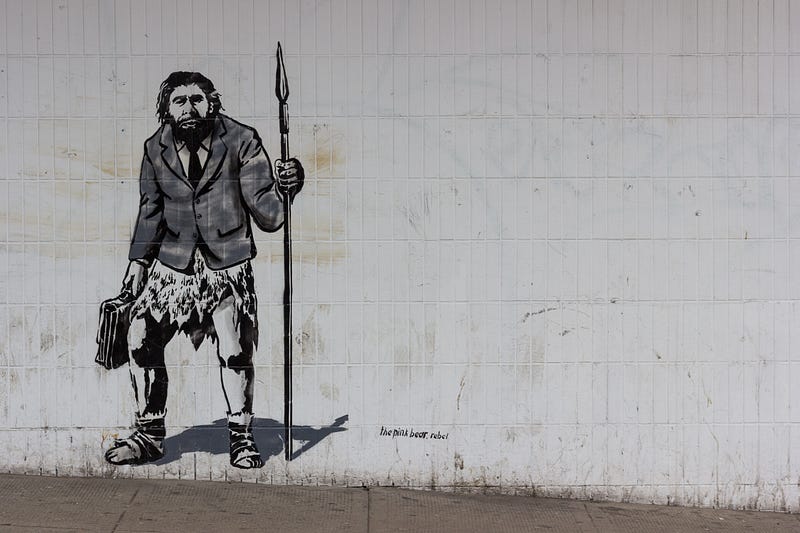Unveiling Our Connection: Neanderthals and Modern Humans
Written on
Chapter 1: The Legacy of Our Ancestors
As we ponder the fate of the various human species that roamed the Earth, it's evident that Homo sapiens emerged as the last standing. Perhaps it's our inherent curiosity or desire for connection that drives us to seek both similarities and differences with our ancient relatives. Over the years, scientific advancements have significantly reshaped our understanding of these prehistoric beings, especially the Neanderthals, who may not have been as distinct from us as once thought.
Over the decades, science has greatly expanded our comprehension of ancient human relatives. Recent theories surrounding Neanderthal extinction and new findings reveal that we share more traits with them than previously believed.
Section 1.1: Discovering Similarities
The thought of coexisting with our human relatives from the past is indeed fascinating. Fossil evidence suggests that despite some physical differences, our skeletal structures are remarkably similar. Neanderthals, while generally shorter and more robust than contemporary humans, displayed human-like features and brain sizes. Genetic analysis shows a 99.7% DNA match between us and Neanderthals, compared to a 96-99% match between humans and chimpanzees.
Subsection 1.1.1: The Inside Story

Understanding the intricate ecosystem of microorganisms within our bodies prompts questions about whether similar relationships existed in other human species. The challenge lies in the scarcity of remains from these ancient relatives, making it a rare achievement to extract and analyze their DNA.
Chapter 2: New Findings on Ancient Microbiomes
A groundbreaking study published in Communications Biology in February 2021 unveiled striking parallels in gut bacteria between Neanderthals and modern humans. Researchers analyzed 14 ancient fecal samples from El Salt, Spain, dating back around 50,000 years, marking the oldest known hominin excrement.
Video: Neanderthal and Denisovan DNA in Modern Human Genomes - YouTube
This video delves into the fascinating discoveries regarding the DNA of Neanderthals and Denisovans in modern human genomes, shedding light on our shared ancestry.
The researchers employed shotgun metagenomic analysis to uncover ancient bacterial DNA, leading to astonishing findings.
The Results
Guess how many bacterial DNA sequences were identified in these ancient samples? The number is staggering—approximately 124,592,506 sequences were detected, with many still present in our systems today.
Two significant insights emerged from the study: first, these ancient bacteria play a crucial role in our health and survival, indicating an evolutionary advantage in maintaining these microbial relationships. Secondly, there is evidence of a decline in these ancestral bacteria among Western populations, potentially correlating with rising autoimmune disorders.
Additionally, contrary to the belief that Neanderthals were exclusively carnivorous, evidence suggests they maintained a varied diet, including substantial plant matter.
Why Is This Relevant?
Consider the remarkable reality that microorganisms influencing our brains and health today were also part of the lives of our ancient relatives. This knowledge broadens our understanding of what constitutes human health. According to Stephanie Schnorr, a postdoctoral researcher and co-author of the study, these findings illuminate the complexities of our biology.
Reflecting on this, I can't help but connect the dots between Western dietary habits and the decline of crucial bacterial strains. The reputation of Western diets—characterized by large portions and processed foods—raises questions about our overall health and the potential contributions to the decline of beneficial gut bacteria.
Perspective Shift
Learning about our similarities with other human species encourages us to appreciate our shared lineage. For countless years, we were not alone on this planet. While we often perceive ourselves as uniquely distinct, ancient humans likely influenced our development as much as we influenced them.
Understanding that Neanderthals enjoyed a varied diet rich in both plants and animals invites us to consider the importance of nutrition for maintaining our gut health. It seems prudent to nurture our bodies with nutrient-dense foods, ensuring our gut microbiome flourishes, as these ancient bacteria are indeed our allies.
This article was originally published in the author’s free newsletter, Curious Adventure. It was edited and republished on Medium with her consent. Katrina Paulson reflects on humanity's past, embracing unanswered questions and the thrill of discovery through her writing. Subscribing to her newsletters provides access to her articles and a wealth of archived content. Thank you for engaging with her explorations.
Video: Neanderthal Genome Project: Insights into Human Evolution - YouTube
This video explores the Neanderthal Genome Project, offering insights into human evolution and our genetic connections to Neanderthals.